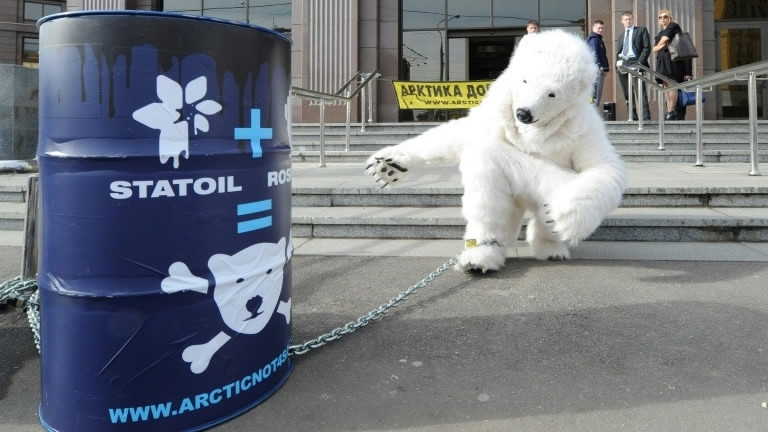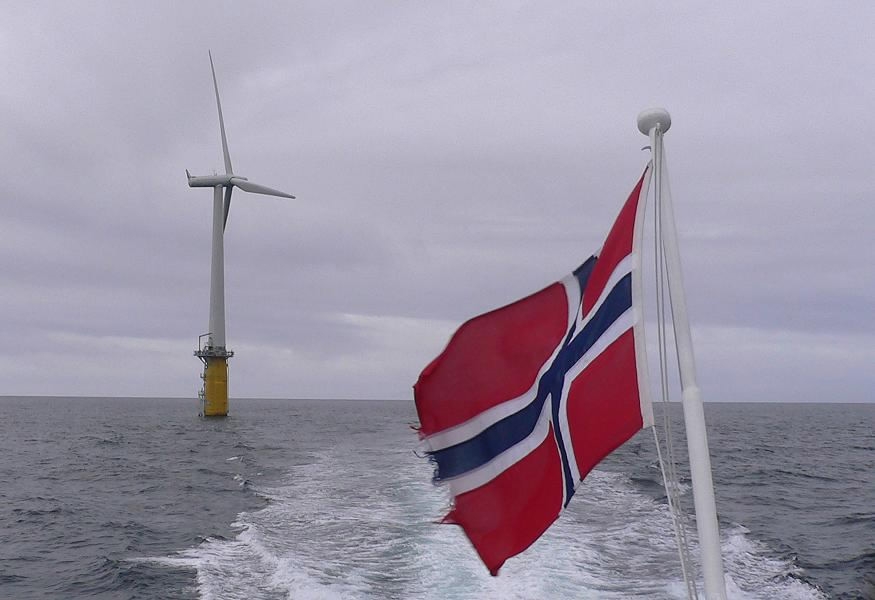
Tech & Sci
17:45, 14-Nov-2017
Environmentalists take Norway to court over Arctic drilling

A lawsuit brought by Greenpeace and another group opposed to drilling in the Arctic will face representatives for Norway, western Europe's biggest oil producer, in an Oslo court on Tuesday.
Greenpeace, along with Natur og Ungdom (Nature and Youth), an environmental group targeting youths, has sued the Norwegian state over licences awarded in 2016 for oil prospecting in the Barents Sea.
The plaintiffs accuse Norway of violating the COP 21 Paris accord and a section of the constitution amended in 2014 that guarantees the right to a healthy environment.
They claim this is the first time a state has been taken to court for violating the agreements signed at the COP21 climate change conference in Paris in December 2015, which came into force in November last year.
"It is clear to us that this new search for oil is in violation of the Paris Agreement and the Norwegian constitution, and we look forward to raising these arguments in court," the head of Greenpeace Norway, Truls Gulowsen, said in a statement.
Norway's oil revenues are dwindling, as displayed by crude oil production being halved since 2001.
In May 2016, it awarded 10 licences covering a total of 40 blocs to 13 oil companies, including Norway's state-owned mammoth Statoil, US groups Chevron and ConocoPhillips, Germany's DEA, Japan's Idemitsu, Sweden's Lundin, OMV of Austria and Russia's Lukoil.
The two NGOs are now calling for the concessions to be cancelled because of the environmental risks.

A Norwegian flag waving in front a statoil prototype floating wind turbine. /AFP Photo
A Norwegian flag waving in front a statoil prototype floating wind turbine. /AFP Photo
Protecting future generations
Contacted by AFP on Monday, the lawyers representing the Norwegian state refused to comment.
Norway has insisted it is abiding by the constitution and the "validity of the licences cannot therefore be attacked on this basis," energy ministry spokesman Ole Berthelsen said.
Three of the most contested licences are located in the immediate vicinity of a maritime border with Russia that has remained unexplored until now, in an area that the two countries long disputed before reaching an agreement in 2010.
One of these zones is the northernmost Norway has ever opened to prospecting, and the NGOs are concerned about its proximity to the ice floes.
"The Norwegian government, like every government, has an obligation to protect people's right to a healthy environment," said Ingrid Skjoldvaer, a spokeswoman for Natur og Ungdom, in a statement.
With drilling in the Arctic, "it is us in the younger generation, and our children, who will feel the worst effects of this oil being burned."
Record number of blocs
Paradoxically, Norway is also home to the world's biggest fleet of electric cars per capita. It aims to end sales of new cars equipped with only combustion engines by 2025.
But Norway's black gold has also enabled it to build up the world's biggest sovereign wealth fund, today worth around 1 trillion US dollars.
In June, Norway proposed opening up oil exploration in a record number of blocs in the Arctic waters of the Barents Sea, despite opposition by environmentalists and some parts of its own administration.
Of the blocs the oil and energy ministry put on offer, 93 are located in the Barents Sea and nine others in the Norwegian Sea, also above the Arctic circle.
The Nordic country was one of the first to ratify the Paris Accord, which aims to maintain the rise in temperatures to under 1.5 degrees.
But the oil industry considers the waters opened to prospecting, especially those close to Russia – ice-free thanks to the Gulf Stream – to be promising, crucial for Norway at a time when its oil production has been in constant decline since peaking in 2000.
The court case is expected to continue until November 23.
Source(s): AFP

SITEMAP
Copyright © 2018 CGTN. Beijing ICP prepared NO.16065310-3
Copyright © 2018 CGTN. Beijing ICP prepared NO.16065310-3